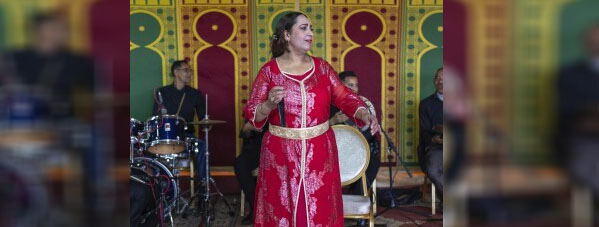Women folk singers are preserving Aita, a Moroccan folk singing style.

Mbarka Moullablad’s family disliked her intention to become a cheikha and sing about love, grief, and social reform under the stage name “Thouria.”
She and other Moroccan women preserve aita, a folk singing style that means “cry” or “lament” in Arabic. They perform at weddings, festivals, private parties, and pub nights in Morocco’s main towns and rural regions, enchanting both rich and poor audiences.
Despite their prominence in Moroccan society, aita performers do not always find acceptance. Stigmatization, eroticization, and marginalization plague Cheikha. Moullablad originally feared that, but her community in Sidi Yahya Zaer, an agricultural village on Morocco’s Atlantic lowlands, has mainly welcomed her.
“My family didn’t agree at first, and I used to suffer from society’s judgment, but now everything is good,” Moullablad said after a performance south of Rabat. “I do it to support my kids.”
Aita has long explored social achievements, paradoxes, and hidden challenges, such as relationships and economic adversity, through her sung poetry. Cheikha sings about their community’s struggles and successes with silk caftans, glittering takchita belts, and heavy makeup. They swing their hips to express passion, dancing seductively or joyfully.
Moullablad’s sweet voice draws people in as she rises octaves into a roar. Her sister Fatiha dances with shaking beads on her tummy. The band leader, another vocalist, sings poetry while a drummer beats, a guitarist strums, and a violinist pulls his bow.
Visitors claim Cheikha may express a community’s reality via singing about marriage, agriculture, and colonial resistance. Moullablad sings Moroccan Arabic, expressing her culture. Cheikha in the North African Kingdom also perform in Amazigh, adapting the music and lyrics to their location.
Modern performances like the electro-infused “Aita, Mon Amour” and Kabareh Cheikhats, a group of male performers who dress and sing like Morocco’s most famous 20th-century women folk singers, are influenced by the art form. The Moroccan Academy Awards nomination for this year, “Everybody Loves Touda,” follows a single mother who leaves her Atlas Mountains hamlet to sing in Casablanca’s clubs, cabarets, and hotels.
I always marveled at their strength and influence when they spoke. At the Marrakech Film Festival last year, the film’s director, Nabil Ayouch, remarked that all audiences, whether modern or conservative, get up and go into a gospel trance.
Moroccan music is adopting Middle Eastern pop and rap by North African diaspora singers. Rural areas are disappearing as the country urbanizes. Though AITA’s future is uncertain, its artists and listeners believe it will survive.
Because young people refresh it, Aita will survive. Both the elderly and the young will always cherish Aita. Cheikh aita singer Rachid Kadari stated it is enhanced but kept its roots.



